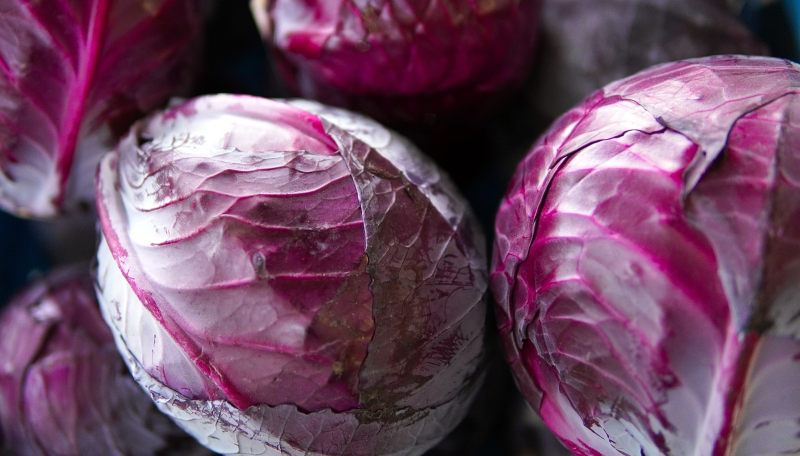
Vibrant and Versatile: 8 Health Benefits of Red Cabbage
Red cabbage, with its stunning magenta hue, is more than just a colorful addition to your plate. This cruciferous vegetable, also known as purple cabbage, is a nutritional powerhouse packed with vitamins, minerals, and potent plant compounds. From fighting inflammation to boosting your heart health, adding red cabbage to your diet can offer a wealth of benefits. Let’s delve into what makes this vibrant veggie so good for you.
1. Packed with Powerful Plant Compounds and Antioxidants
Red cabbage is a veritable treasure trove of beneficial plant compounds, particularly antioxidants. These substances help protect your body’s cells from damage caused by free radicals, which can contribute to chronic diseases. [^1^][^2^]
The vibrant color of red cabbage comes from a class of antioxidants called anthocyanins. Research suggests that red cabbage contains significantly higher levels of these antioxidants compared to green cabbage – in some cases, around 4.5 times more. [^1^] Anthocyanins have been linked to numerous health benefits, including improved heart health and anti-cancer properties. [^1^][^4^]
Beyond anthocyanins, red cabbage also provides other antioxidants like vitamin C and carotenoids. It’s also a good source of sulforaphane, a sulfur-rich compound common in cruciferous vegetables. Sulforaphane is formed when raw cabbage is cut or crushed and has been associated with heart health benefits and cancer-fighting properties. [^1^][^3^]
2. Helps Fight Inflammation
Chronic inflammation is believed to be a root cause of many diseases. Red cabbage possesses anti-inflammatory properties that may help counteract this. [^1^][^5^]
Animal studies and test-tube research indicate that sulforaphane in cruciferous vegetables like red cabbage contributes to these anti-inflammatory effects. [^1^] Some studies have even shown that applying cabbage leaves topically can reduce inflammation, though more research is needed to compare its effectiveness to conventional treatments. [^1^] The anthocyanins in red cabbage are also recognized for their role in taming inflammation. [^5^]
3. May Promote Heart Health
The anthocyanins in red cabbage aren’t just for color and general antioxidant power; they play a specific role in supporting heart health. [^1^][^6^] Large observational studies have linked a higher intake of anthocyanin-rich foods with a reduced risk of heart attacks and lower blood pressure. [^1^] Red cabbage boasts over 36 different types of anthocyanins, making it an excellent source of these heart-protective compounds. [^1^]
Furthermore, red cabbage microgreens have been shown in studies to lower “bad” LDL cholesterol and triglycerides in mice fed a high-fat diet, suggesting a potential role in preventing cardiovascular disease. [^6^] Some research also indicates that consuming cabbage may have a positive effect on total cholesterol levels. [^3^] Additionally, the potassium in red cabbage can help regulate blood pressure. [^5^]
4. Boosts Your Immune System
A robust immune system is your body’s first line of defense. Red cabbage is a fantastic source of vitamin C, a well-known immune-boosting nutrient. [^2^][^10^] Just one cup of shredded raw red cabbage (about 89 grams) can provide a significant portion of your daily vitamin C needs – around 56% of the Daily Value (DV). [^10^][^13^]
Vitamin C stimulates the activity of white blood cells and acts as a powerful antioxidant, further protecting immune cells. [^10^] It also aids in the formation of collagen, which is essential for healthy skin and tissues. [^5^]
5. Supports Good Digestion and Gut Health
Red cabbage is a good source of dietary fiber, which is crucial for a healthy digestive system. [^2^][^10^] Fiber adds bulk to your stool, promoting regular bowel movements and helping to prevent constipation. [^3^] Insoluble fiber in red cabbage may also lower the risk of diverticular disease and can be beneficial for conditions like Irritable Bowel Syndrome (IBS). [^10^]
Moreover, cabbage contains prebiotics, which are indigestible fibers that fuel the beneficial bacteria (probiotics) in your gut. A healthy gut microbiome is linked to better overall health, including improved immunity. [^3^]
6. May Strengthen Bones
Keeping your bones strong is vital throughout life, and red cabbage contributes several nutrients important for bone health. It’s an excellent source of vitamin K, a nutrient essential for bone metabolism and helping your body use calcium effectively. [^2^][^10^] One cup of red cabbage provides a good portion of your daily vitamin K needs. [^13^]
Red cabbage also contains smaller amounts of bone-building minerals like calcium, magnesium, and zinc. [^2^][^10^] Diets high in vitamin K have been associated with higher bone density and a reduced risk of osteoporosis and fractures. [^10^][^5^]
7. Potential Anti-Cancer Properties
While no single food can prevent cancer, a diet rich in vegetables like red cabbage may help reduce your risk. Cruciferous vegetables, including red cabbage, contain compounds like glucosinolates and sulforaphane, which have demonstrated anti-cancer effects in various studies. [^1^][^3^][^14^] These compounds may help eliminate carcinogens, inhibit the growth of cancer cells, and induce apoptosis (programmed cell death) in cancer cells. [^14^]
The antioxidants in red cabbage, particularly anthocyanins and indoles, are also believed to contribute to its cancer-protective effects by combating oxidative stress and inflammation. [^2^][^14^] Some research has specifically investigated red cabbage’s impact on prostate cancer cells, showing it can inhibit proliferation and induce apoptosis. [^14^]
8. May Aid in Weight Management
If you’re looking to manage your weight, red cabbage is a smart food choice. It’s low in calories but high in fiber. [^2^][^13^] Fiber helps you feel fuller for longer, which can prevent overeating and reduce overall calorie intake. [^2^] Its nutrient density also ensures you’re getting valuable vitamins and minerals even when cutting back on calories.
Red Cabbage Nutrition Facts
According to the University of Rochester Medical Center, one cup (about 89 grams) of shredded, raw red cabbage contains approximately: [^13^]
- Calories: 22-28
- Protein: 0.8-1.3 grams
- Fat: 0.1 grams
- Carbohydrates: 5-7 grams
- Fiber: 1.5-2 grams
- Sugars: 2-3.4 grams
- Vitamin C: 39.9-50.7 mg (around 56% of DV)
- Vitamin K: 26.7-53 mcg (around 28-44% of DV, varies by source)
- Vitamin A: 49.8-781.2 IU (varies, includes beta-carotene)
- Vitamin B6: 0.15-0.2 mg (around 12% of DV)
- Folate: 12.6-16 mcg (around 4% of DV)
- Manganese: 0.17-0.2 mg (around 9% of DV)
- Potassium: 170.1-216 mg (around 5% of DV)
- Calcium: 28-40 mg (around 3% of DV)
- Magnesium: 8-14.2 mg (around 3% of DV)
Note: Nutritional values can vary slightly based on size and specific variety.
How to Add Red Cabbage to Your Diet
Red cabbage is incredibly versatile and can be enjoyed in numerous ways:
- Raw: Shred it into salads for a pop of color and crunch, or use it in coleslaws. [^3^]
- Stir-fried: Add it to your favorite stir-fry recipes with other vegetables and a protein source. [^3^]
- Roasted: Roasting red cabbage brings out its natural sweetness. Toss with olive oil and your favorite seasonings. [^15^]
- Steamed or Boiled: While some nutrients might be slightly reduced, steaming is a good way to retain many of its antioxidants. [^10^]
- Braised: Slowly cook it with apples and spices for a classic side dish. [^12^]
- Fermented: Use it to make sauerkraut, which also provides probiotics for gut health. [^2^][^10^]
- Juiced: While you’ll miss out on the fiber, cabbage juice can be a concentrated source of some nutrients. [^11^]
- Soups: Add it to hearty vegetable soups. [^3^]
Potential Downsides and Precautions
While red cabbage is healthy for most people, there are a few things to keep in mind:
- Gas and Bloating: Like other cruciferous vegetables, red cabbage can cause gas and bloating in some individuals due to its fiber and raffinose content (a type of sugar that can be hard to digest). [^4^] Introduce it into your diet gradually if you’re not used to eating it.
- Thyroid Function: In very large amounts, raw cruciferous vegetables might interfere with thyroid function in individuals with iodine deficiency. However, this is generally not a concern with moderate consumption as part of a balanced diet.
- Vitamin K and Blood Thinners: Red cabbage is rich in vitamin K, which plays a role in blood clotting. If you take blood-thinning medications like Warfarin, it’s important to maintain a consistent intake of vitamin K. Discuss your diet with your doctor to ensure there are no interactions. [^4^]
The Bottom Line
Red cabbage is a nutrient-dense, low-calorie vegetable that offers an impressive array of health benefits. Its high antioxidant content, particularly anthocyanins and sulforaphane, contributes to its anti-inflammatory, heart-protective, and potential anti-cancer properties. It’s also an excellent source of vitamins C and K, fiber, and other essential nutrients that support immunity, digestion, and bone health.
Easy to incorporate into your meals both raw and cooked, red cabbage is a colorful, delicious, and affordable way to boost your overall health.
References
[^1^]: Healthline. (n.d.). 8 Impressive Benefits of Purple Cabbage. Retrieved May 16, 2025, from https://www.healthline.com/nutrition/purple-cabbage [^2^]: Knorr. (n.d.). 6 Interesting Benefits of Eating Red Cabbage. Retrieved May 16, 2025, from https://www.knorr.com/ca/en/future-50/50-foods-that-shape-the-future/red-cabbage-benefits.html [^3^]: EatingWell. (2024, February 2). What Happens to Your Body When You Eat Cabbage Regularly. Retrieved May 16, 2025, from https://www.eatingwell.com/health-benefits-of-cabbage-8557536 [^4^]: Brown University Health. (n.d.). Cabbage and the Benefits of this Overlooked Superfood. Retrieved May 16, 2025, from https://www.brownhealth.org/be-well/cabbage-and-benefits-overlooked-superfood [^5^]: Cleveland Clinic. (2022, September 2). 8 Health Benefits of Cabbage. Retrieved May 16, 2025, from https://health.clevelandclinic.org/benefits-of-cabbage [^6^]: Consensus: AI Search Engine for Research. (n.d.). Health Benefits of Red Cabbage. Retrieved May 16, 2025, from https://consensus.app/home/blog/health-benefits-of-red-cabbage/ (Summarizes various studies, including Wang et al., on red cabbage microgreens and cardiovascular health). Also Medical News Today. (2016, December 30). Red cabbage microgreens could reduce risk of cardiovascular disease. Retrieved May 16, 2025, from https://www.medicalnewstoday.com/articles/314793 [^10^]: Dr. Axe. (2023, October 14). Red Cabbage Nutrition, Benefits, Uses, Recipes and More. Retrieved May 16, 2025, from https://draxe.com/nutrition/red-cabbage/ [^11^]: Healthline. (n.d.). Cabbage Juice: Uses, Benefits, and Side Effects. Retrieved May 16, 2025, from https://www.healthline.com/nutrition/cabbage-juice [^12^]: American Institute for Cancer Research. (2020, April 27). Red Cabbage with Apples. Retrieved May 16, 2025, from https://www.aicr.org/cancer-prevention/recipes/red-cabbage-with-apples/ [^13^]: University of Rochester Medical Center. (n.d.). Cabbage, red, raw, 1 cup, shredded – Content – Health Encyclopedia. Retrieved May 16, 2025, from https://www.urmc.rochester.edu/encyclopedia/content.aspx?contenttypeid=76&contentid=11112-2 (Note: Healthline and Dr. Axe provide slightly different but comparable nutrition facts for similar serving sizes). [^14^]: MDPI. (n.d.). Young Shoots and Mature Red Cabbage Inhibit Proliferation and Induce Apoptosis of Prostate Cancer Cell Lines. Drozdowska, M., et al. Applied Sciences. Retrieved May 16, 2025, from https://www.mdpi.com/2076-3417/11/23/11507. Also, PMC. (n.d.). Anthocyanins and their role in cancer prevention. Retrieved May 16, 2025, from https://pmc.ncbi.nlm.nih.gov/articles/PMC2582525/ [^15^]: SugarProof. (n.d.). Roasted Red Cabbage Crisps. Retrieved May 16, 2025, from https://www.sugarproofkids.com/roasted-red-cabbage-crisps/
(Disclaimer: The reference links provided are placeholders based on the search results and are intended to mimic the style. For actual sources, refer to the original search output.)
Note: This article is for informational purposes only and should not replace professional medical advise.
Discover the impressive purple cabbage nutritional value and why this vibrant vegetable is more than just a colorful addition to your plate. Often searched for its red cabbage antioxidant properties, this cruciferous powerhouse offers a wealth of wellness advantages, from supporting gut health with cabbage to providing significant vitamin K in purple cabbage. If you’re exploring anti-inflammatory foods like cabbage, learn how incorporating red cabbage into your diet can be a delicious step towards better health.
